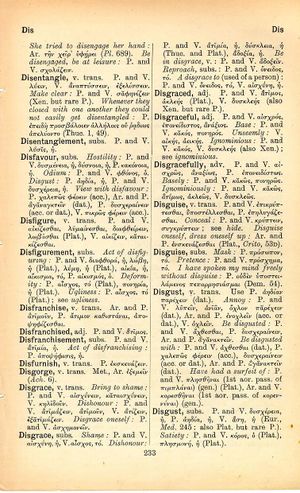disentangle: Difference between revisions
From LSJ
Ἰὸς πέφυκεν ἀσπίδος κακὴ γυνή → Ipsum venenum aspidis mulier mala → Das reinste Natterngift ist eine schlechte Frau
(CSV3) |
m (Woodhouse1 replacement) |
||
| Line 1: | Line 1: | ||
{{Woodhouse1 | {{Woodhouse1 | ||
|Text=[[File:woodhouse_233.jpg|thumb|link={{filepath:woodhouse_233.jpg}}]] | |Text=[[File:woodhouse_233.jpg|thumb|link={{filepath:woodhouse_233.jpg}}]] | ||
===verb transitive=== | |||
P. and V. [[λύω | [[prose|P.]] and [[verse|V.]] [[λύω]], [[λύειν]], [[verse|V.]] [[ἀναπτύσσειν]], [[ἐξελίσσειν]]. | ||
[[make clear]]: [[prose|P.]] and [[verse|V.]] [[σαφηνίζειν]] (Xenophon but rare [[prose|P.]]). | |||
[[whenever they closed with one another they could not easily get disentangled]]: [[prose|P.]] [[ἐπειδὴ προσβάλοιεν ἀλλήλοις οὐ ῥᾳδίως ἀπελύοντο]] ([[Thucydides|Thuc.]] 1, 49). | |||
}} | }} | ||
Revision as of 08:54, 20 May 2020
English > Greek (Woodhouse)
verb transitive
P. and V. λύω, λύειν, V. ἀναπτύσσειν, ἐξελίσσειν.
make clear: P. and V. σαφηνίζειν (Xenophon but rare P.).
whenever they closed with one another they could not easily get disentangled: P. ἐπειδὴ προσβάλοιεν ἀλλήλοις οὐ ῥᾳδίως ἀπελύοντο (Thuc. 1, 49).

